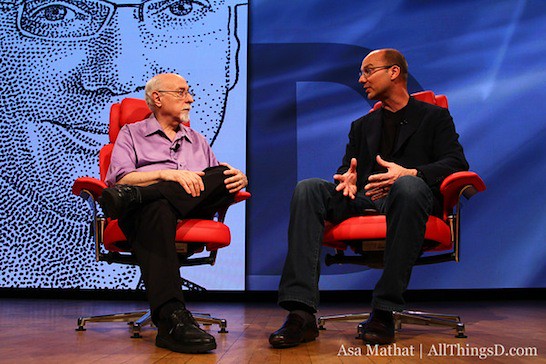
Google’s Android chief Andy Rubin, who incidentally used to work for Apple, sat down on Wednesday with Walt Mossberg at the AsiaD conference to discuss, what else, Android and the latest Galaxy Nexus from Samsung.
So while the bulk of the interview centered on Android and Google’s newly released Android 4.0 Ice Cream Sandwich OS, Mossberg did take some time to bring up two of Google’s top competitors – Apple and Microsoft.
When asked about Apple’s losing a step now that Steve Jobs is no longer running the show, Rubin said he’s confident Apple’s path of innovation won’t wane anytime soon.
“I don’t think anything like that,” Rubin said. “I used to work at Apple,” he said, noting it was his first big job.
Rubin noted that Apple still has the same ingredients that have made it a success, though it will miss Steve’s leadership. “Now it is time for some of the other guys to step up.”
As for Siri, Apple’s new voice recognition personal assistant, Rubin wasn’t particularly enthralled saying that Android has no intention of turning devices into personal assistants.
“I don’t believe that your phone should be an assistant,” Rubin said. “Your phone is a tool for communicating. You shouldn’t be communicating with the phone; you should be communicating with somebody on the other side of the phone.”
Fair enough, but pretty hypocritical given that Android has long had extensive voice recognition capabilities baked into the OS.
Still, Rubin does give props where props are due and did acknowledge that fellow Android co-founder has his own speech recognition company called Wildfire while also noting that General Magic – the company he worked for after Apple – also worked on voice recognition.
“This isn’t a new notion,” said Rubin. “In projecting the future, I think Apple did a good job of figuring out when the technology was ready to be consumer-grade.”
With respect to Microsoft, Rubin said that they did what every smart company does when entering a market late into the game – innovate on a different axis.
“I think that’s what Microsoft did with their Metro UI,” he said. “I think it is a bold move.”
That said, “from my taste and my perspective, it could be very dangerous for Microsoft,” he said. He suggested that Windows Phone leaves less room for creativity and for software and hardware makers to express themselves.
via All Things D





Thu, Oct 20, 2011
News